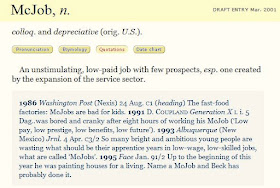Another month, another set of job numbers from north and south of the border. I thought I'd used the release of this month's figures as a vehicle to engage in a deeper analysis of what's being pushed within the confines of Canada's rarefied political class and offer up a critique about how policy makers are viewing the labour market through a set of rose-coloured glasses. This post examines the numbers, knocks around a mandarin for a little fun, and then considers whether some real policy alternatives might be on the horizon.
171,000 jobs were created in the United States in October 2012, which is a relatively strong showing given the prevailing economic uncertainty The unemployment rate increased from 7.8% to 7.9%; however, this isn't necessarily a bad sign as it would seem to indicate that more people are entering the labour market as the participation rate increases. Contrast the American job creation record with that occurred in Canada where only 1800 jobs were created which is extremely weak. The youth labour market continues to stagnate with the youth unemployment rate at 14.7% and the R8 rate sitting at 17.7% - simply put, there's been no recovery of any consequence for Canada's youth.
 Beneath a surface a far more disturbing picture emerges from the longer term trends in Canada's job data. Public sector hiring is masking mounting job losses in the private sector, but this trend isn't sustainable as governments within Canada have drunk the austerity kool-aid and have committed to further structural adjustment programs aimed at slashing the number of public-sector workers. Beyond this, with Canada being an export driven economy the global economic uncertainty there could be further job losses within the already decimated manufacturing sector.
Beneath a surface a far more disturbing picture emerges from the longer term trends in Canada's job data. Public sector hiring is masking mounting job losses in the private sector, but this trend isn't sustainable as governments within Canada have drunk the austerity kool-aid and have committed to further structural adjustment programs aimed at slashing the number of public-sector workers. Beyond this, with Canada being an export driven economy the global economic uncertainty there could be further job losses within the already decimated manufacturing sector.
Tiff Macklem, the Bank of Canada's Senior Deputy Governor, recently misled the public when he painted a rosy picture of a strong labour market recovery in the wake of the financial crisis. Armine Yalnizyan, the CCPA's senior economist, attacks the official storyline advanced by Macklem and Canada's political class by exposing how real wages are actually declining and newly hired young workers face a low-wage reality where they can expect 40% less than the average wage.
Now why are young workers job prospects not neatly lining up with the spurious Canada's Economic Action Plan propaganda? It be might because we're importing low-wage, no benefits Irish or Chinese workers to steal jobs from young Canadians. It could be due to explicit support for two-tiered entitlement schemes from union leaders and conservative politicians. Or perhaps the regulatory failure that has occurred within the youth labour market where governments have absolved themselves from addresses pernicious rise of unpaid work. In reality it's all the aforementioned factors and a great many more that are hobbling the prospects of young workers in Canada.
But where's the response from government? Well, there isn't one. Despite a sizeable and growing amount of research that points out the gospel of neoliberalism is robbing a generation of any notion of economic security there has been an absolute dearth of any concrete policy alternatives within mainstream discourse within Canada's political class; however, this facade may be starting to crack slightly. Last week there was an interesting, albeit shallow, article in the Globe and Mail discussing the problems within Canada's youth labour market; furthermore, Rick Salutin, a columnist with the Toronto Star, wrote a highly critical editorial yesterday pointing out our failing approach to dealing with the school to labour market transition.
What's sorely needed are public policy approaches that combat the growing precarity, rising income inequality, widespread economic insecurity, and a lack of control that defines the lived experience of many Canadians (particularly youth in their 20s and 30s). Guy Standing, one of my favourite theorists, sketches what a progressive agenda might look like in his highly recommended book The Precariat. In the final chapter of the book he advances an agenda premised on freedom and basic security that calls for concrete action to address the maldistribution of income, the creation of a politics of time, regrowing the commons, control of knowledge, and real access to financial capital.
We exist in a different world than the one existed in the past, the worst thing that could happen would be to go back to the old norm. This old style thinking was partially on display in Justin Trudeau's first foray into public policy this week when he addresses the hollowing out of the "middle class", but it also contained some references to precarious position of youth via references to part-time jobs, stagnating wages, and rising income inequality. Whether Mr. Trudeau falls into the trap of calling for a return of the "good ole' days" or takes the more difficult (but necessary) route of addressing the needs of the growing Canadian precariat remains to be seen, but regardless there's a small modicum of relief to see that at least two of the major political parties finally paying at least lip service to the realities of the new economy. That's all I have for now. Finally, take a peek at this video of Guy Standing lecturing about the precariat, see:


I found his comment that there has been a growing re-regulation of the job market in the US and that 1/3 of Americans require a licence for their job. I 'd be interested in seeing similar analysis for Canada.
ReplyDelete